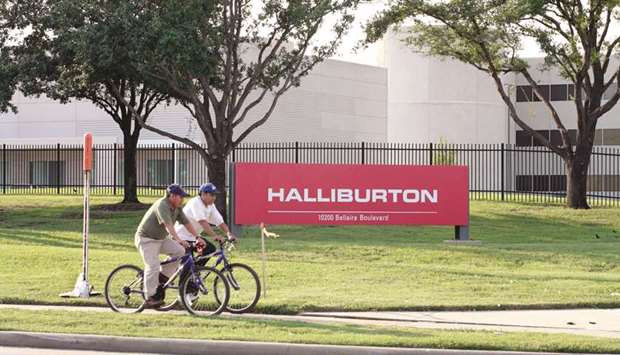Halliburton delivered an optimistic view for its US and international operations as rising oil prices spur demand for oilfield services.
“I am very excited about the way 2018 is shaping up,” said chief executive Jeff Miller during the firm’s quarterly earnings call. “North American unconventional activity should be very busy,” he added, referring to growth in production from US shale.
Halliburton also reported a fourth-quarter charge of $385mn for its operations in Venezuela, which has been mired in political and economic turmoil.
Halliburton said it would continue to “vigorously pursue” payments from its primary customer in Venezuela going forward, but also said it expected continuing delays in payments.
The company posted a profit of 53 cents a share, beating the average analyst estimate of 46 cents per share, as per Thomson Reuters I/B/E/S.
The company was upbeat about the health of the US oil industry given the rise in oil prices and increased drilling.
The US rig count is up almost 35% from last year to 936, according to data from General Electric’s Baker Hughes
“Commodity prices are supportive of increasing activity in North America and I am encouraged by the increase in tender activity and the positive discussions we are having with our international customers,” Miller said in a statement.
Halliburton, which makes more than half its revenue from North American operations, said total revenue rose to $5.9bn for the quarter, from $4.02bn a year earlier.
Revenue in North America came in at $3.4bn, up from $1.8bn last year.
The uptick in drilling activity in the United States drove up cost for sand and trucking during the quarter, the company said on its call.
Halliburton said it expected its sand costs to decline in 2018 as local mines come online.
The company also reported $882mn in tax charges, largely the result of preliminary tax provisions related to the new US tax law that was passed last month.
A stronger outlook for the international market follows a nearly 24% climb in the global Brent futures contract in the past three months.
“As for the international market, I’m encouraged for the first time in three years,” said Miller.
UBS
UBS is increasing payouts to shareholders as growing business with its core base of wealthy clients helps to offset the effects of tighter regulation and a one-off 2.9bn Swiss franc ($3bn) hit from US tax reforms.
The Swiss bank, which manages than more than $2tn of the world’s wealth, said yesterday it would increase its annual dividend to 0.65 francs per share from 0.60 francs the year before, and buy back up to 2bn francs of shares over three years — its first such buyback since the financial crisis.
Announcing the merger of its Wealth Management and Wealth Management Americas divisions, the company said it expected the unified business to deliver net new money growth of 2-4% per year and double-digit pretax profit growth.
Since the financial crisis, UBS has focused on beefing up its profitable wealth management business — which today serves around half of the world’s billionaires — and paring back its capital-intensive investment bank, a strategy cross-town rival Credit Suisse is now replicating in its own overhaul.
Following record inflows to its international wealth management business last year, UBS anticipates further growth as expanding Asian economies fuel an increase in the number of the world’s ultra-wealthy.
With banking regulations getting tougher, UBS said it was removing a link between future shareholder payouts and a measure of its capital strength.
In early December, financial regulators reached a deal to harmonise global banking rules, capping a decade of effort to make banks more resilient and requiring many of them to increase their capital reserves.
For UBS, the changes mean it has to bulk up its capital cushion, which it expects might grow by 4bn francs over the next three years.
But the reforms have also brought certainty.
“Greater regulatory clarity means we can open a new chapter for UBS, allowing us to sharpen our focus on growth across our businesses and deliver attractive returns to shareholders,” chief executive Sergio Ermotti said in a statement.
UBS posted a 2.2bn franc net loss for the fourth quarter of 2017, hit by a 2.9bn franc writedown due to US
tax reforms. Pretax earnings, though, were up 34%.
UBS said its new Global Wealth Management business would be jointly run by Martin Blessing, who earlier ran Germany’s Commerzbank, which was rescued by the state in the financial crash, and American Tom Naratil.
The reshuffle follows the surprise departure in December of the international business’s 50-year-old head Juerg Zeltner, though Ermotti said that had “zero to do” with the changes.
“Juerg Zeltner and Tom Naratil were working for two years toward combining the wealth management units,” Ermotti said during a press conference.

